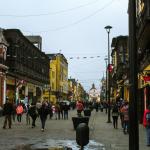As I left the beautiful, colonial Franciscan church in downtown Lima, Peru with a college friend who had traveled with me to my native country for a few weeks, five military trucks with water cannons raced down the narrow street beside the imposing structure. I had watched the news before driving downtown – protestors were gathering near Congress. My friend, alarmed, said, “what are we going to do now?” Calmly I responded, “we will just walk the opposite way from where the trucks went.” Had we walked three blocks behind the church we would have found violent protestors at the Plaza Bolivar in front of Congress. We chose however to walk two blocks the other way where we enjoyed a wonderful outdoor lunch sitting by the main square of the city.
As a priest I meet many who struggle with reoccurring impatience and anger. These may be directed toward a particular person or a situation that has emerged in their lives. The inability to effect a change rapidly leads to these two common sins. The mere mention of the offending person, or a reminder of the hurtful situation initiates a process inside the person that adds salt to the wound. As hard it is to understand, when the water cannons of life rush by in front of us, we tend to run behind them right into the trouble, rather than walking in the opposite direction. There is a tendency to allow the offending parties to continue to hurt us even in their absence. We walk into the trouble ourselves.
I oftentimes reflect on the passage from the Gospel of Saint John where Jesus stands next to a woman caught in adultery and invites the elders to cast stones at her if they have no sin. None of them do and walk away. I imagine the woman picking up a stone dropped just seconds before by one of the scribes, and then proceed to hit herself on the head with it. Jesus, absolutely stunned, would ask, “what are you doing? Nobody has condemned you, why are you condemning yourself?” As ridiculous as my imagined scenario is, it reflects a common tendency to hurt ourselves without the assistance of others. Again, rather than walking away or letting go, we run into the protest or we hit ourselves with a stone.
One of my greatest joys as a priest is sharing the mercy of Jesus when I hear confessions. Burdened and troubled hearts approach, and they leave uplifted and joyful. No sin is too great, no offense unpardonable – there is true freedom in God’s mercy. As a confessor, I understand that I am in a privileged position, not for my sake, but so that sinners may experience first-hand God’s mercy and His loving embrace. I am able to reassure others to accept forgiveness, and to encourage them to extend it to their neighbor so that the restlessness deep within can be quenched. Rather than running along with the military trucks right into the protest where only further damage happens, Jesus invites us to walk away from sin and its effects, to embrace mercy and to enjoy a peaceful moment instead.












